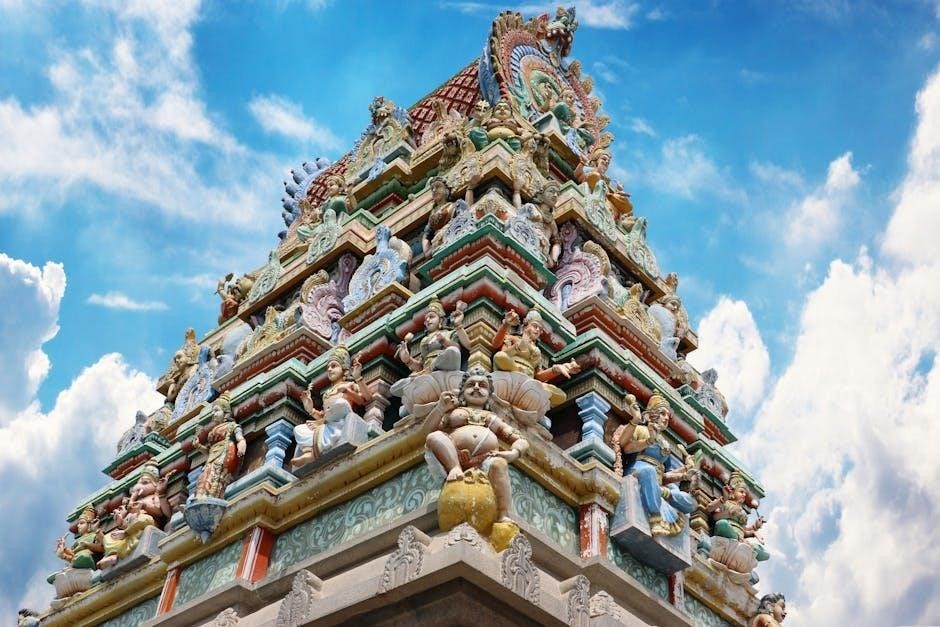The Vinayagar Agaval is a devotional hymn dedicated to Lord Ganesha, also known as Vinayagar. It holds significant cultural and religious importance in Tamil tradition. The poem praises Lord Ganesha.
Definition and Significance
The Vinayagar Agaval is a revered devotional poem dedicated to Lord Ganesha, also known as Vinayagar, a prominent deity in Hinduism. This hymn is deeply rooted in Tamil culture and holds immense significance for devotees seeking blessings and guidance from Lord Ganesha. The term “Agaval” refers to a specific type of Tamil poetic meter, characterized by its simplicity and accessibility, making the hymn easily understandable and relatable to a wide audience. The Vinayagar Agaval is not merely a collection of verses; it is a spiritual tool used to invoke the divine presence of Lord Ganesha, seeking his blessings to remove obstacles, grant wisdom, and ensure success in all endeavors. Reciting or listening to the Agaval is believed to create a positive atmosphere, fostering inner peace and strengthening one’s connection with the divine.

Vinayagar Agaval: An Overview
Lord Ganesha and Vinayagar Agaval
Lord Ganesha, the elephant-headed deity, holds a special place in the hearts of millions as the remover of obstacles and the god of new beginnings. The Vinayagar Agaval serves as a powerful medium to connect with Lord Ganesha, offering praise and seeking his divine intervention. The hymn beautifully describes the various attributes and qualities of Lord Ganesha, highlighting his wisdom, compassion, and power. Through vivid imagery and poetic language, the Agaval paints a picture of Lord Ganesha as a benevolent and accessible deity, one who is always ready to assist his devotees. Reciting the Vinayagar Agaval is considered a sacred practice, believed to invoke the blessings of Lord Ganesha, paving the way for success, happiness, and spiritual growth. The hymn acts as a bridge between the devotee and the divine, fostering a deep sense of devotion and surrender.

Historical Context
The Vinayagar Agaval was composed by Avvaiyar, a revered Tamil poet. She was known for her wisdom and devotional works, solidifying her place in Tamil literary history.
Avvaiyar: The Tamil Poet
Avvaiyar, the celebrated Tamil poet, is the author of the Vinayagar Agaval. A figure of immense respect in Tamil literature, Avvaiyar’s works often revolve around ethical guidance, moral teachings, and devotional expressions. She is believed to have lived during the Chola dynasty, a period of great cultural and literary flourishing in Tamil Nadu.
Avvaiyar’s poetry is characterized by its simplicity, profound wisdom, and accessibility to all. Her verses serve as a guide for righteous living, emphasizing the importance of education, compassion, and devotion. The Vinayagar Agaval stands as a testament to her deep devotion to Lord Ganesha and her skill in crafting devotional hymns that resonate with devotees across generations. Her legacy endures as a beacon of wisdom.
10th Century Composition
The Vinayagar Agaval is believed to have been composed in the 10th century, a period coinciding with the reign of the Chola dynasty in Tamil Nadu. This era marked a significant period of cultural and artistic efflorescence, with advancements in literature, architecture, and religious practices. The composition of the Agaval during this time reflects the prevailing devotional sentiments and the prominence of Lord Ganesha in the religious landscape.
The 10th century witnessed a surge in devotional literature, with poets and scholars expressing their reverence for various deities through hymns, poems, and songs. The Vinayagar Agaval stands as a prominent example of this devotional outpouring, capturing the essence of devotion to Lord Ganesha in its verses. Its composition reflects the cultural and religious climate of the era.
Chola Dynasty Connection
The Chola dynasty, which flourished in South India from the 9th to the 13th centuries, had a notable connection to the Vinayagar Agaval. The poem was composed during the Chola period, reflecting the religious and cultural milieu of the time. The Chola rulers were known for their patronage of art, literature, and religious institutions, contributing to the growth of devotional practices centered around deities like Lord Ganesha.
The Agaval’s composition during the Chola era suggests that it may have been performed in temples and other religious settings under the dynasty’s patronage. The Chola dynasty’s influence contributed to the Agaval’s prominence as a devotional hymn to Lord Ganesha.

Content and Structure
The Vinayagar Agaval is structured as a devotional hymn. It praises Lord Ganesha, seeking his blessings. The hymn explores different thematic elements and highlights the religious path.
Devotional Hymn to Lord Ganesha
The Vinayagar Agaval stands as a profound devotional hymn dedicated to Lord Ganesha, also revered as Vinayagar. Penned in Tamil, it encapsulates deep reverence and admiration for the deity. As a hymn, it serves as a powerful medium for devotees to connect with Lord Ganesha. Through its lyrical verses, devotees express their faith, seek blessings, and offer prayers.
The Agaval is considered a sacred composition within Tamil religious tradition, celebrated for its ability to invoke the divine presence of Ganesha. Recitation of the hymn is believed to remove obstacles and bestow prosperity upon the devotee. The hymn also plays a significant role in fostering spiritual growth and deepening the bond between the devotee and the divine. The Agaval thus represents a pathway to divine grace through devotion and prayer.
Thematic Elements of the Agaval
The Vinayagar Agaval is rich in thematic elements that contribute to its devotional and spiritual significance. One prominent theme is the glorification of Lord Ganesha’s divine attributes. The hymn vividly portrays Ganesha’s physical form, his wisdom, and his role as the remover of obstacles. Another key theme revolves around seeking Ganesha’s blessings for prosperity and well-being.
Devotees recite the Agaval with the intention of overcoming challenges and attaining success in their endeavors. The hymn also delves into the concept of surrendering to the divine, emphasizing the importance of faith and devotion in spiritual growth. Furthermore, the Agaval touches upon the interconnectedness of all beings and the significance of leading a righteous life. The hymn serves as a guide for devotees seeking spiritual enlightenment.
Religious Path in Tamil Tradition
The Vinayagar Agaval plays a crucial role in the religious path within Tamil tradition. It serves as a powerful tool for devotees seeking to connect with Lord Ganesha and deepen their spiritual understanding. Recitation of the Agaval is considered a sacred practice, believed to invoke Ganesha’s blessings and guidance. The hymn is often chanted during religious ceremonies and festivals, creating a devotional atmosphere and fostering a sense of community.
The Agaval’s teachings emphasize the importance of devotion, self-discipline, and ethical conduct in one’s spiritual journey. By internalizing the Agaval’s message, individuals strive to overcome their inner obstacles and attain spiritual liberation. The hymn provides a framework for living a meaningful and purposeful life, rooted in faith and compassion. The Vinayagar Agaval helps devotees find inner peace.
Availability and Formats
The Vinayagar Agaval is widely accessible in PDF format, offering devotees a convenient way to read and download the sacred hymn. This format preserves the Tamil script.
PDF Format of Vinayagar Agaval
The Vinayagar Agaval is readily available in PDF format, making it easily accessible for devotees worldwide. This digital format allows users to download and read the hymn on various devices, including computers, tablets, and smartphones. The PDF versions often preserve the original Tamil script, ensuring that readers can experience the poem in its authentic form.
Several online resources offer free PDF downloads of the Vinayagar Agaval. These resources cater to those seeking to connect with the devotional poem. The availability of the PDF format contributes to the widespread dissemination and preservation of this important Tamil literary work. It allows individuals to easily engage with the text.
The digital format also facilitates easy printing, allowing devotees to create physical copies for personal use or distribution. This accessibility ensures that the Vinayagar Agaval remains a vibrant part of Tamil religious practice.
Tamil Script and Unicode
The Vinayagar Agaval is traditionally written in Tamil script, a beautiful and ancient writing system. Preserving the authenticity of the hymn requires accurate representation of the Tamil characters. With the advent of digital technology, Unicode has become essential for encoding and displaying the text correctly across different platforms.
Unicode, particularly UTF-8 encoding, ensures that each Tamil character is represented by a unique code point, allowing for consistent rendering on computers, websites, and mobile devices. This is crucial for the widespread availability and accurate display of the Vinayagar Agaval in digital formats, including PDF documents.
Many online resources offer the Vinayagar Agaval in both Tamil script and Unicode formats. This allows users to choose the version that best suits their needs. The use of Unicode ensures the poem is accessible to a global audience. This also preserves its linguistic integrity.
Online Resources and Downloads
Numerous online platforms offer resources for accessing the Vinayagar Agaval. Devotees and researchers can find the hymn in various formats, including text and PDF. These resources facilitate easy access and dissemination of the sacred text. Many websites provide downloadable PDFs of the Vinayagar Agaval in Tamil script.
These PDFs are often available for free, making the hymn accessible to a wide audience. Some websites also offer audio recordings of the Agaval, allowing listeners to immerse themselves in the devotional recitation. Unicode versions of the text are frequently available for digital use and study.
Online libraries and archives may host digitized versions of the Vinayagar Agaval, providing historical context and scholarly analysis. These resources serve as valuable tools for preserving and promoting the cultural heritage associated with the hymn. Explore reputable websites and archives for reliable versions and additional information.

Impact and Influence
The Vinayagar Agaval deeply influences Tamil culture, fostering devotion to Lord Ganesha. Recitation removes obstacles, bringing blessings. The hymn holds significant cultural and religious value in Tamil Nadu.
Overcoming Obstacles Through Recitation
The Vinayagar Agaval’s power lies in its ability to help devotees overcome obstacles through recitation. It is believed that singing this hymn with devotion pleases Lord Ganesha, who is known as the remover of obstacles. The poem is chanted to seek blessings for success in endeavors and to eliminate difficulties in life.
The Agaval is a source of solace and strength, providing guidance and encouragement to those facing challenges. Through its verses, devotees find the courage to persevere and the wisdom to navigate life’s complexities. Reciting the Agaval is a spiritual practice that fosters inner peace and resilience.
The transformative effect of reciting the Vinayagar Agaval is well-documented, with many individuals attesting to its positive impact on their lives. By invoking the divine presence of Lord Ganesha, devotees find the strength to overcome obstacles and achieve their goals, enriching their lives.
Cultural Significance in Tamil Nadu
The Vinayagar Agaval holds immense cultural significance in Tamil Nadu, deeply woven into the fabric of its religious and social life. This devotional hymn is an integral part of Vinayagar Chaturthi celebrations, where it is recited in temples and homes, creating a spiritually charged atmosphere. Its verses echo through generations, preserving tradition.
The Agaval’s cultural importance extends beyond festivals, influencing various aspects of Tamil life. It is often taught to children, instilling values and cultural heritage from a young age. The poem’s themes of devotion, perseverance, and divine grace resonate with people of all ages, fostering a sense of community and shared identity.
The Agaval’s enduring legacy is a testament to its profound impact on Tamil culture, serving as a source of inspiration, guidance, and cultural pride. It reinforces the importance of faith and community in overcoming life’s challenges, continuing to enrich the cultural landscape of Tamil Nadu.

